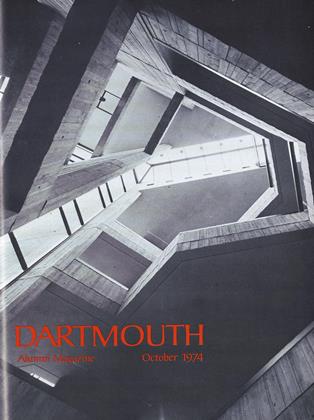By Sara Castro Klarén (AssistantProfessor of Romance Languages). Lima(Peru): Instituto de Estudios Peruanos, 1973.109 pp.
In 1969, José Mara Arguedas, singular interpreter of Peruvian Highlands society, and in particular of Peruvian Indian society, put an end to his tormented existence. The death of this complex, tortured man - who wrote and published, he once said, because unless he did so he would surely shoot himself - has deprived us of a unique and talented novelist.
Never a prolific writer, forever in crisis because he could not write, Arguedas nonetheless managed to publish two collections of short stories and four novels during his lifetime. His final but unfinished novel was published posthumously.
In those works, writes his fellow Peruvian novelist, Mario Vargas Llosa, "the Indian truly enters into Peruvian literature." With his passing, Peruvian letters are once again lacking a major writer capable of penetrating and presenting the Peruvian Indian world, for unlike his predecessors and contemporaries Arguedas wrote about the Peruvian Indians from the point
of view of someone who was at one with them. Though not born Indian he had grown up Indian and thus not only had a profound understanding of their way of life but also shared in their vision of the world.
Arguedas was 58 years old when he died. His death did not come in the waning years of his literary career, but while he was still wrestling with his craft. Although a cohort of Cortázar, Fuentes, Garcia Márquez, and Vargas Llosa, whose literary creations are characterized by experimentation in all aspects of novelistic technique, Arguedas in contrast to them worked exclusively within the framework of the realistic novel, laboring to recreate the intensely expressive speech of the alienated, the dispossessed, the marginalized; striving to give authenticity, integrity, and artistic unity to his literary creations.
Professor Klarén perceptively and lucidly describes the character and composition of that world in her pioneering work. Hers is a phenomenological study of Arguedas' three major novels - Yawar fiesta, Los rîos profundos, Todas las sangres - of the internal dynamics of those works, of the various rhetorical devices which Arguedas utilized, of Arguedas' haunting and anguished vision. This is no panegyric, but a tough-minded description and analysis of Arguedas' successes and failures. And because that analysis is sensitively and intelligently done, because the text is highly interesting and most readable, Arguedas' literary world becomes more accessible and understandable and, therefore, more meaningful.
Mr. Madrid, a faculty member at DartmouthCollege from 1965 to 1970, is now AssociateProfessor of Spanish and Chicano Studies atthe University of Minnesota.
 View Full Issue
View Full Issue
More From This Issue
-
 Feature
Feature"THE KINGDOM OF GOD HAS COME"
October 1974 By MARy BISHOP ROSS -
 Feature
FeatureMore than a beast, Less than an angel
October 1974 By PETER A. BIEN -
 Feature
FeatureMountain of Storms
October 1974 By ANDREW HARVARD, TODD THOMPSON -
 Feature
FeatureBelieve It or Not!
October 1974 By GREGORY C. SCHWARZ -
 Article
ArticleBig Green Teams
October 1974 By JACK DEGANGE -
 Class Notes
Class Notes1923
October 1974 By WALTER C. DODGE, DR. THEODORE MINER
Books
-
 Books
BooksIn Christ's Own Country
-
 Books
BooksTHE AUTOBIOGRAPHY OF JOHANNES BUTZBACH, A WANDERING SCHOLAR OF THE FIFTEENTH CENTURY.
June 1936 By Ashley K. Hardy '94 -
 Books
BooksTHE HISTORY OF THE ORDER OF THE BATH AND ITS INSIGNIA.
MARCH 1973 By CARL BRIDENBAUGH '25 -
 Books
BooksSOLDIERS AND SCHOLARS: Military Education and National Policy
March 1957 By DONALD H. MORRISON -
 Books
BooksON COPIA OF WORDS AND IDEAS.
JUNE 1964 By JOHN W. ZARKER -
 Books
BooksPop Fiction
MARCH|APRIL 2019 By JULIA M. KLEIN

